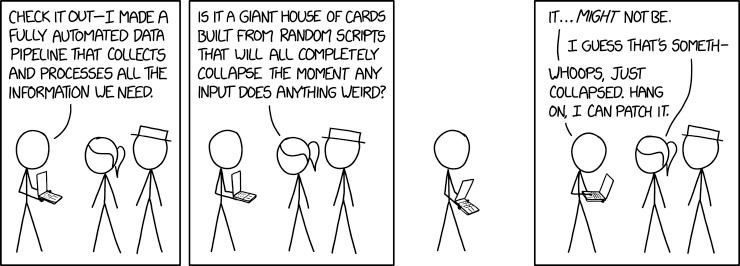
The move towards cloud data warehouses and the emergence of new ELT tooling have changed the way we approach data processing. To enable data democratization, organizations invest in modern data stacks that involve new skills. As a result, the roles and responsibilities that existed in traditional data teams are also changing.
Analytics engineers were born as a response to these changes. However, the large and sudden demand for this new role creates scarcity, buzz and confusion. Yet, many data specialists have progressively adapted to these changes and are, in part, already assuming the role of analytics engineer.
I address this blog post to a specific group of data professionals: those who’ve had a front-row seat to the rise of analytics engineering – data analysts.
Is analytics engineering for you?
You know the pain
Data analysts are all too familiar with the problems analytics engineers solve. Some common pain points are:
- Limited data availability
- Poor data quality
- Time-consuming, repetitive data preparation
- Inappropriate tooling
- Lack of data literacy across the business
- An infinite backlog of ad-hoc requests…
In traditional teams, analysts spend most of their time working around these problems, leaving little room for delivering impactful insight… Frustrating .
The good thing about frustration is that it forces us to change our approach and grow .

Are you engineering curious?
PeopleAnalysts differ in how they tackle their daily frustrations, depending on where their motivation lies.
Some analysts are eager for someone else to fix the above mentioned problems for them, so they can spend more time analyzing data. After all, this is what they signed up for.
On the other hand, some decide to address these issues themselves – and they like it. They enjoy optimizing and automating workflows and anticipating problems. As a consequence, their role takes another dimension through new responsibilities. They look for and adopt tools and practices that make ELT easier, efficient, reliable and scalable. Their end goal is to enable self-service analytics for everyone, rather than answer every business question themselves.
If you can relate, keep reading: you may have found your next career move.
The hard truth ️
If you’re considering a move, the next big question is: Do I have the right skillset? There is so much tooling out there that, from the outside in, analytics engineering can seem overwhelming.
However, the truth is that everyone in the field is learning. No one can claim to know it all. The market is evolving at a rapid pace, with new tools and features released every day.
The ability and desire to discover and learn new concepts is as important as your existing skillset.
As a data analyst, you may already have the core skills that will allow you to develop proficiency quickly as an analytics engineer, such as:
- Writing performant, readable code (in SQL, and maybe Python)
- Building and maintaining a data model
- Writing production-grade ELT pipelines
- Being cloud savvy
- Translating business needs into technical solutions, and vice versa
- Some understanding of software engineering practices, such as keeping your code DRY (don’t repeat yourself) or using Git for version control
Now what?
Data analysts with the tools and motivation to solve engineering problems they face daily already are, in essence, analytics engineers. However, they may not have access to the tools, resources and focus to develop themselves as such.
The great variety of profiles among analytics engineers gives the opportunity to learn from people with all sorts of relevant expertise and broaden our horizons.
At GoDataDriven, we particularly value knowledge sharing and benefit from a community of like-minded experts and resources to support our continuous development. If you’d like to know more abut this role, feel free to reach out to have a chat.




